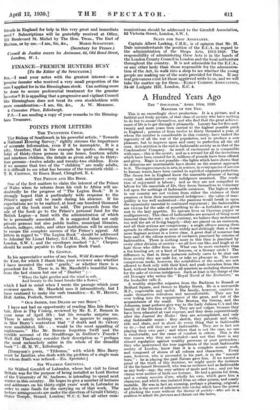POINTS FROM LETTERS
THE TWENTIETH CHILD.
The Bishop of Southwark in his powerful article, " Towards a National Housing Survey," rightly stresses the importance of accurate information, even if it be incomplete. It is a pity, therefore, that in the example he quotes, showing a total of thirty-three persons in one house, fourteen adults and nineteen children, the details as given add up to thirty- four persons—twelve adults and twenty-two children. Even if we assume that two of the " children " are really adults, it is difficult to see what has become of the twentieth child.— T. R. CHITSON, 10 Essex Road, Chingford, E. 4.
THE PRINCE AND His Booh.
One of the first matters to claim the interest of the Prince of Wales when he returns from hiS visit to Africa will un- doubtedly be the progress of " The Legion Book." It is 'strongly hoped that a particularly wide response to the Prince's appeal will be made during his absence. If his expectations are to be realized, at least one hundred thousand copies of the book must be sold. The proceeds from the sale of the book go to the Prince's personal fund for the British Legion—a fund with the administration of which he is personally associated. It is suggested that not only private persons but also public bodies, municipal libraries, schools, colleges, clubs, and other institutions will be anxious to ensure the complete success of the Prince's appeal. All letters in regard to The LegiOn Book "should be addressed to Admiral Sir Lionel Halsey, G.C.M.G., St. James's Palace, London, S.W; 1, and the envelopes marked " L." Cheques should be Amide payable to the Legion Book Fund.
To GENTLE.
In his appreciative notice of.my book, Wild Exmoor through the Year, for which I thank him, your reviewer asks whether I have invented the verb " gentle," or whether there is a precedent for it. There is, in Mr. Maselield's beautiful lines, from the last stanza but one of " Dauber "
When the light gentles and the wind is soft,
And beauty in the heart breaks like a flower," which I had in mind when I wrote the passage-which your reviewer quotes. Mr. Masefleld uses it intransitively, but I have 'ventured to make the verb transitive.—E. W. H.ENDY, Holt Antiss, Porlock, Somerset.
S' OUR SISTER, THE DEATH OF THE BODY.".
I have not had an opportunity of reading Miss Iris Barry's tale, Here is Thy Victory, reviewed by Mr. E. F. Benson in your issue of April 5th ; but his remarks surprise me. There is surely nothing new, as he appears to suppose, in Miss Barry's contention that " if death and its victory were annihilated, life . . . would be the most appalling of nightmares." Has Mr. Benson forgotten - Swift and the terrible account of the Struldbrugs in Gulliver's Travels ? Well did Thackeray consider their description as " perhaps the most melancholy satire in the whole of the dreadful book" M. W., Edinburgh.
[Tennyson's poem, " Tithonus," with which Miss Barry must be familiar, also deals with the problem of a single man to whom death was -refused.—ED. Spectator.]
SIR' WILFRED GRgNFELL.
Sir Wilfred Grenfell of Labrador, whose last visit to Great Britain was for the purpose of being installed as Lord Rector of the University of St. Andrews, is intending to spend next winter in this country. He hopes to give a number of lectures and addresses on his thirty-eight years' work in Labrador in order to raise funds for the carrying on of that work. The lecture arrangements are Under the direction of Gerald Christy; Outer Temple, Strand, London; W.C. 2, but-all other cone,
munications should be addressed to the Grenfell Association, 82 Victoria Street, London, S.W. 1.
SEATS FOR SHOP ASSISTANTS.
Captain Albert Larking, C.B.E., is of opinion that Mr. H. Dale misunderstands the position of the E.C.A. in regard to the administration of the Shops Acts, 1912-1928. The responsibility of administering these Acts is in the hands of the London County Council in London and the local authorities throughout the country. It is not admissible for the E.C.A., or any other body than those responsible for the administra- tion of the Act, to walk into a shop to see whether the young people are making use of the seats provided for them.. If any real grievances exist let those agvieved write to us, and we will take the matter up for them.—EARLY CLOSING ASSOCIATION, 34-40 Ludgate Hill, London, E.C. 4.


























































 Previous page
Previous page